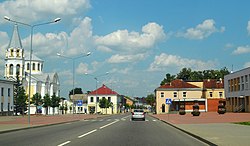Vilkmergė
| Ukmergė | ||
|---|---|---|
| City | ||
 |
||
|
||
| Location of Ukmergė | ||
| Coordinates: 55°15′N 24°45′E / 55.250°N 24.750°ECoordinates: 55°15′N 24°45′E / 55.250°N 24.750°E | ||
| Country |
|
|
| Ethnographic region | Aukštaitija | |
| County | Vilnius County | |
| Municipality | Ukmergė district municipality | |
| Eldership | Ukmergė town eldership | |
| Capital of |
Ukmergė district municipality Ukmergė town eldership Pivonija eldership |
|
| First mentioned | 1333 | |
| Granted city rights | 1486 | |
| Population (2017) | ||
| • Total | 21,226 (15th) | |
| Time zone | EET (UTC+2) | |
| • Summer (DST) | EEST (UTC+3) | |
Ukmergė (![]() pronunciation (Latin: Vilkomiria, Polish: Wiłkomierz, Russian: Вилькомир, Yiddish: ווילקאמיר Vilkomir) is a city in Vilnius County, Lithuania, located 78 km (48 mi) northwest of Vilnius, with a population of about 21,000 (2017).
pronunciation (Latin: Vilkomiria, Polish: Wiłkomierz, Russian: Вилькомир, Yiddish: ווילקאמיר Vilkomir) is a city in Vilnius County, Lithuania, located 78 km (48 mi) northwest of Vilnius, with a population of about 21,000 (2017).
The city took its original name Vilkmergė from the Vilkmergėlė River, which was initially called Vilkmergė and assumed a diminutive form after the growth of the settlement. It is commonly thought that the name may be translated as "she-wolf", from the combination of Vilkas (wolf) and Merga (maiden). More likely the second root of the dual-stemmed name is the verb merg-/merk- meaning "to submerge" or "to dip". According to local legend, Vilkmergė was a girl raised by wolves, who bridged the divide between animals and humans, in the same way as Rudyard Kipling's Mowgli. The folk etymology of "Ukmergė", by contrast, is "farm girl" (Lith. ūkis = farm). The original name has been adopted by the local soccer team, "Vilkmergė Ukmergė" as well as popular HBH Vilkmergė beer.
Other historic names for the city include Wilkemerge or Wilkamergen in 1225, Vilkenberge (1333), Wilkinberg (1384), (1455), Vilkomir (1455), Wilkomir (1611), Wilkomirz (1613), Wilkomiria (1766), Ukmerge (1900), Aukmergė (1908); Ūkmergė (1911), Wilkomierz (1918), and Vilkmergė (1919).
...
Wikipedia


